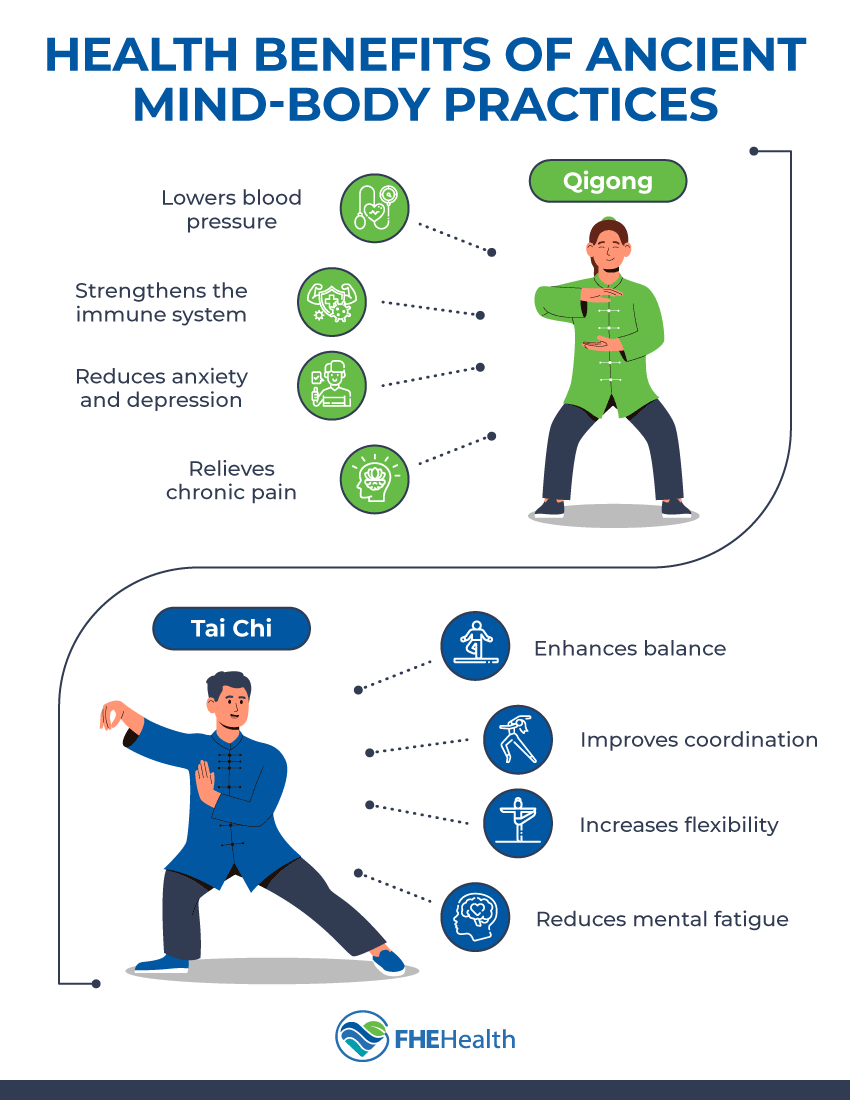
Did ancient Chinese healers understand something about mental health that modern medicine is just catching up to in recent decades? Maybe — the type of mind-body practices inherent in Chinese medicine thousands of years ago can have a beneficial impact on physical and mental health. Learn more about whether cultivating a tai chi habit can positively impact mental health or substance abuse recovery below.
The Origins of Tai Chi and Qigong
Qigong refers to a mind-body exercise that’s foundational to tai chi. Both integrate components of meditation, purposeful breathing, and slow, intentional movement. They’re used for physical exercise and potential healing practice and are part of a long tradition in Eastern martial arts.
As an ancient Chinese healing practice, qigong is at least 2,000 years old and has contributed to various mindfulness practices through the years. It has evolved into practices such as tai chi alongside a growing and changing Chinese culture, and in modern times, these mindfulness practices have been adopted to support physical fitness, clear-headed thinking, and meditation habits.
Health Benefits of These Practices
Tai chi and qigong benefits can be mental, physical, emotional, or spiritual. The type of benefits you receive from these mind-body practices depend on how often you engage in them, which type of tai chi you do, and what your baseline is when starting.
Some physical health benefits of these practices include:
- Better balance. The type of motions you do in tai chi and related practices help build core balance, reducing your risks of falls and helping you develop other types of physical fitness activities if desired.
- Improved coordination. Tai chi and other exercises based on qigong require you to move all of your body in a coordinated, purposeful way. This can help you develop better coordination.
- Increased flexibility. The way you move and stretch in tai chi can enhance your overall flexibility.
- Enhanced immune and cardiovascular health. These practices can improve circulation and increase your body’s endurance and vitality.
- Less chronic pain. Regular gentle movements, such as those associated with tai chi, can reduce inflammation flare-ups associated with conditions like fibromyalgia or arthritis.
How They Promote Mental and Physical Balance
Many people use tai chi for mental health, as it can provide benefits associated with reduced stress and anxiety, enhanced clarity, and better mood. Mind-body practices help promote this type of balance through:
- Slow, intentional movements. The slow, intentional movement associated with tai chi forces you to be present and concentrate on each part of your body. It’s physical exercise, but it won’t set your heart racing the same way time on the treadmill does, which can be helpful for a nervous system that’s already prone to fight or flight. This calming activity helps reduce cortisol levels in the body and supports an overall feeling of calm.
- A focus on breathing. Focusing on breathing techniques as you move through a tai chi routine enhances all the benefits obtained from the slow, purposeful movement. It can also help you slip into a sense of relaxation to combat anxiety, heavy emotions, or other mental health challenges. These same breathing techniques can be used at other times for the same purpose.
- Meditation practices. Finally, these mind-body practices couple physical movement with meditation. By developing a habit of calm focus, you become more adept at drawing on these coping mechanisms when you need them outside of tai chi. This can enhance your concentration and reduce mental fatigue.
Evidence Supporting the Effectiveness of Tai Chi
Studies have demonstrated that treating mental health conditions with medication alone isn’t highly effective. For example, 60% of individuals with depression who are treated solely with antidepressants fail to achieve substantial recovery. However, incorporating a mindfulness practice such as tai chi can increase someone’s chances of experiencing less severe symptoms and even achieving remission.
Extensive studies have looked at the impact of tai chi on older adults who’ve experienced anxiety and depression symptoms. Between 65% and 93% of older adults reported improved mental health symptoms when incorporating structured tai chi into their routines.
In another literature review published by the Journal of Affective Disorders, the impact of tai chi on mental health was compared with the impact of general (non-mindful) exercise. The review concluded that tai chi may be more effective in supporting better mental health than non-mindful physical fitness activities.
Mind-Body Practices as Part of Comprehensive Treatment
As with any health and wellness practice, tai chi and other mindfulness exercises provide the best results when they’re part of a comprehensive approach. This is especially true if you’re seeking help with a mental health or substance abuse disorder.
Tai chi may be a great exercise to help ward off occasional blues or increase your focus and calm on a daily basis. However, if you’re experiencing serious mental health symptoms, such as severe depression, anxiety that gets in the way of regular life or an inability to stop abusing alcohol or drugs, you probably can’t tai chi your way out of the issue.
Instead, consider working with mental health providers that encourage a holistic approach that leverages mind-body practices alongside evidence-based treatment, such as medication management, cognitive behavioral therapy, and EMDR therapy.
Find Out More From FHE Health
If you’re dealing with anxiety, depression, eating disorders, substance abuse, or other mental health challenges, FHE Health can help. Our caring team promotes a holistic approach to treatment that includes physical fitness and mind-body practices as well as individual and group therapy, medication management when appropriate, acupuncture, recreational therapy, and other approaches.
Don’t struggle with your mental health or substance abuse disorder alone. We can help you strike a balance in treatment that works for you and develop skills and practices you can use in long-term recovery. Contact us today to let us know what you’re struggling with and our compassionate counselors will help you understand what treatment may be right for you.







